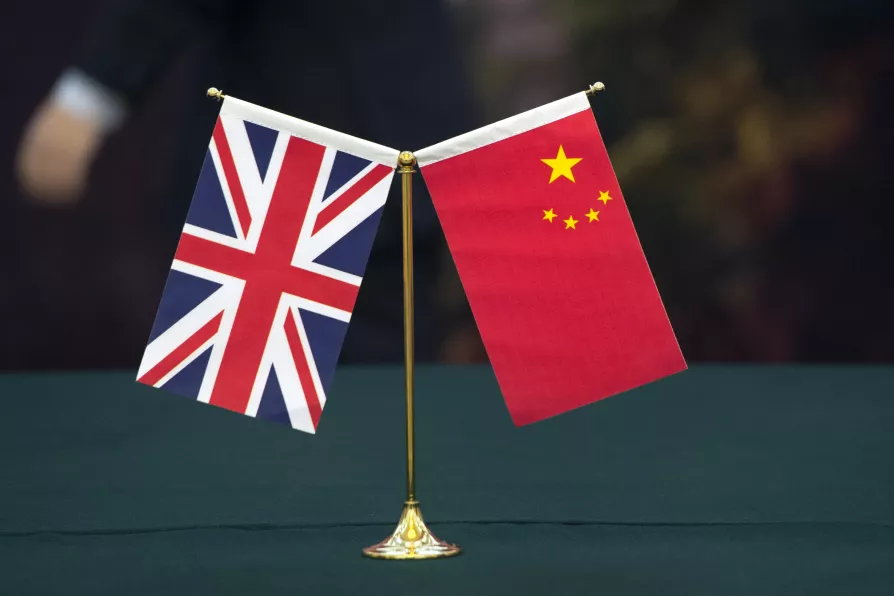CHRISTMAS 2025 is celebrated under the shadow of the hunger strikers imprisoned in British jails because of their solidarity with the Palestinian people.

 The union flag and the flag of the People's republic of China
The union flag and the flag of the People's republic of China
IN BRITAIN as in the United States there is a political consensus around China-baiting. Never has the old saw that when the House of Commons is united it is nearly always wrong been more applicable.
In one of his last appearances at the dispatch box as Tory leader, Rishi Sunak spent his time at Prime Minister’s Questions this week running through a familiar litany of sinophobic talking points, prompted apparently by Foreign Secretary David Lammy’s impending visit to Beijing.
First, there were the military manoeuvres the People’s Republic is conducting near Taiwan, internationally acknowledged to be Chinese territory under the “one China” principle.
Then there was the human rights situation in Hong Kong, a former British colony where London maintained a regime of political repression and the denial of any democratic rights until its return to China in 1997.
That was followed by a denunciation of China for not falling into line with Nato’s position over Ukraine, as if China was obliged to follow the diplomatic diktats of its former imperialist overlords.
And then Sunak raised various purported threats to Britain’s domestic security from China, in higher education and elsewhere.
Sunak is yesterday’s politician. The alarming thing about the exchange is that Keir Starmer agreed with him on every point.
The Prime Minister claimed that Britain stood for co-operation with China where possible, along with competition economically and challenging it over “values” and national security.
In fact, the government’s position is worse than that. It appears fully signed up to the Washington-led agenda of confrontation with China.
This involves conducting a slander campaign about China’s internal affairs while escalating military tension in the Far East, most notably with the Aukus pact with the US and Australia which gives a new twist to the arms race there.
It is not necessary for socialists and peace campaigners in Britain to provide a counter-narrative on every single issue. China can well look after itself and it is sufficient to note that many of the matters raised in this new cold war are China’s internal concerns which it has the sovereign right to address.
More important is to focus on the central issue — this military, political, economic and diplomatic offensive against what will shortly be the world’s largest economy runs profoundly against the interests of working people in Britain.
Addressing the economic and social problems crippling Britain after 15 years of crisis, austerity and degradation of core state functions depends, among other things, on developing links with a Chinese economy that remains among the most dynamic in the world.
Sanctions and disruption of trade will certainly hurt us here in Britain more than they will damage China.
Sorting out our beleaguered higher education sector, with universities on the edge of insolvency, requires more, not fewer, Chinese students.
An intensified arms race of the sort involved in Aukus and other military deployments to the Pacific will also cost working people dear at a time of floundering public services.
Take these points together then, if there is indeed a “black hole” in the public finances, then better relations with China would go a very long way to filling it.
But the main reason for challenging the bipartisan hostility to China is that it is setting the country on the road to war, trailing as ever behind a US desperate to prolong its fading global hegemony.
Britain has no business whatsoever in striking military poses on the other side of the world, nor in interfering in relations between Beijing and Taiwan.
Peace demands an end to sinophobia. The labour and peace movements must step up.

From anonymous surveys claiming Chinese students are spying on each other to a meltdown about the size of China’s London embassy, the evidence is everywhere that Britain is embracing full spectrum Sinophobia as the war clouds gather, writes CARLOS MARTINEZ

From 35,000 troops in Talisman Sabre war games to HMS Spey provocations in the Taiwan Strait, Labour continues Tory militarisation — all while claiming to uphold ‘one China’ diplomatic agreements from 1972, reports KENNY COYLE












